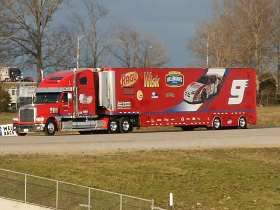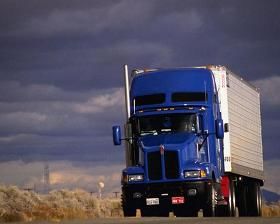Walmart, USF Holland Pros And Cons
Topic 10785 | Page 1
If you snag a job with either of them stay! Lol.. Holland is teamster and good retirement, I've never personally known anyone with walmart, but I'm sure they're good too.
If you want home time, Holland. Otherwise, Walmart is one of the top paying companies, plus uniforms and nice equipment.

I have interviews with both of them next week. Any opinions or info would be very much appreciated. Thanks!!
Hey Chris, Just saw this and thought I'd offer my 2 cents.
I am a dedicated driver with SWIFT and have been assigned to a Walmart grocery DC since March of 2014. Very happy with the work. Although I can't comment on Holland, I certainly can on Walmart. My job and the job of a Walmart driver is basically the same. You will likely be assigned to one of their DCs, either General Merchandise (GM) or Grocery (GRC), delivering to the stores within the territory and picking up backhaul loads from Walmart suppliers/vendors. Walmart drivers many times will work loads with DCs outside of their home DC territory. Not sure of the frequency of this for them or how far they travel from their home DC. I have worked loads for other DCs adjacent to my home DC territory and have requested this in the past.
GM work is typically drop and hook at a store location, occasionally you will encounter a live unload (will take up to 90 minutes because half of it is loose loaded). Grocery work is split between dry and refrigerated. Your trailer could have 1, up to 5 store stops, many times including a backhaul as the last stop. Depending on the store, your last store stop on a dry run could be a drop and hook if an empty is available. Reefers are always live unloads at the store stop. Any backhaul is 75% drop and hook (including reefers). The reefers are 3-zone temp-controlled w/movable bulkheads, allowing 3 different temps for different types of perishable food (ex: dairy, frozen, produce). The driver must be on the dock with the reefer when it's being unloaded to ensure that the correct pallets come-off and the correct pallets are re-loaded, in the correct zone. The average reefer unload time is 30-45 minutes. With that said, longer reefer runs require really good clock-management skills to complete all of your stops.
I have gotten to know many Walmart drivers and without exception they are very happy. Walmart really takes care of their drivers, like gold. They have uniform shirts, and cool/cold weather outerwear. They have a laundry service for the shirts and outerwear so you never need to worry about cleaning them. Many of the DCs have decent cafeterias (7 days, 2 shifts for hot food, 06:00-23:00, 24x7 for a well stocked "vendeteria"), gym, showers, and excellent driver lounges.
Their equipment is meticulously maintained on-site & clean; tractors are driver assigned, relatively new, Qualcom & APU equipped. They are always refreshing the trailer fleet although I occasionally pull dry vans that are over 15 years old. Reefers turn-over more frequently, oldest one I have been under was built in 2009.
I can't think of anything else, hope this helps. And the best of luck to you, driving for Walmart is a highly sought after gig.
Bulkhead:
A strong wall-like structure placed at the front of a flatbed trailer (or on the rear of the tractor) used to protect the driver against shifting cargo during a front-end collision. May also refer to any separator within a dry or liquid trailer (also called a baffle for liquid trailers) used to partition the load.
Dry Van:
A trailer or truck that that requires no special attention, such as refrigeration, that hauls regular palletted, boxed, or floor-loaded freight. The most common type of trailer in trucking.Reefer:
A refrigerated trailer.
Drop And Hook:
Drop and hook means the driver will drop one trailer and hook to another one.
In order to speed up the pickup and delivery process a driver may be instructed to drop their empty trailer and hook to one that is already loaded, or drop their loaded trailer and hook to one that is already empty. That way the driver will not have to wait for a trailer to be loaded or unloaded.
OWI:
Operating While Intoxicated
OOS:
When a violation by either a driver or company is confirmed, an out-of-service order removes either the driver or the vehicle from the roadway until the violation is corrected.
APU:
Auxiliary Power Unit
On tractor trailers, and APU is a small diesel engine that powers a heat and air conditioning unit while charging the truck's main batteries at the same time. This allows the driver to remain comfortable in the cab and have access to electric power without running the main truck engine.
Having an APU helps save money in fuel costs and saves wear and tear on the main engine, though they tend to be expensive to install and maintain. Therefore only a very small percentage of the trucks on the road today come equipped with an APU.


Holland has cut their retired drivers' pensions considerably. Personally, I'd rather have a 401k than a pension. At least if my 401k tanks, I'll probably be the one to blame for mismanaging my own money. I wouldn't want to work for YRC / Holland. I'd rather go with UPSF or ABF if I was set on a union shop.
You'll almost always make more with LTL than truckload. Wal-Mart would be truckload. Holland is LTL. Even still, Wal-Mart trucking jobs are highly coveted.
Do you want truckload or LTL? This is what you need to research, not necessarily comparing specific companies like Wal-Mart vs USF Holland. You can then dig a little deeper, and if you're interested in LTL, research the difference between linehaul and P&D. If you're looking for high wages and better hometime, better to go with LTL than a dedicated truckload gig. The latter is basically like LTL (especially if they're getting you home daily or for the majority of the week), but pays less.
My two cents? If you're considering LTL (Holland / YRC) for whatever reason, more than likely you'll have other LTL outfits in your area. They always seem to group up in locations. There are stronger LTL companies to work for in my opinion, e.g. Old Dominion, Fed Ex Freight, UPSF (they are a union shop), Estes, and ABF (also a union shop).
I started a thread a while back on the topic of LTL where I discuss P&D and linehaul, as well as other concepts related to the LTL sector of trucking.
LTL:
Less Than Truckload
Refers to carriers that make a lot of smaller pickups and deliveries for multiple customers as opposed to hauling one big load of freight for one customer. This type of hauling is normally done by companies with terminals scattered throughout the country where freight is sorted before being moved on to its destination.
LTL carriers include:
- FedEx Freight
- Con-way
- YRC Freight
- UPS
- Old Dominion
- Estes
- Yellow-Roadway
- ABF Freight
- R+L Carrier
P&D:
Pickup & Delivery
Local drivers that stay around their area, usually within 100 mile radius of a terminal, picking up and delivering loads.
LTL (Less Than Truckload) carriers for instance will have Linehaul drivers and P&D drivers. The P&D drivers will deliver loads locally from the terminal and pick up loads returning to the terminal. Linehaul drivers will then run truckloads from terminal to terminal.
Linehaul:
Linehaul drivers will normally run loads from terminal to terminal for LTL (Less than Truckload) companies.
LTL (Less Than Truckload) carriers will have Linehaul drivers and P&D drivers. The P&D drivers will deliver loads locally from the terminal and pick up loads returning them to the terminal. Linehaul drivers will then run truckloads from terminal to terminal.
BTW Chris, not sure if I made it clear or not, but USF Holland was acquired by YRC and is one of their 'brands.'

Thank you very much for input,very helpful and I really appreciate it. I was offered a driving job by both company's but I think Wal Mart is a better fit for me personally.

Thank you very much for input,very helpful and I really appreciate it. I was offered a driving job by both company's but I think Wal Mart is a better fit for me personally.
Awesome, congratulations! Thanks for the update and best of luck to you.

Hey guys can you help me does usf lay off a lot of their workers in slow time an if they do are you still considered a employee an if your are considered a employee do you keep the medical benefits while laid off thanks guys!
New Reply:
New! Check out our help videos for a better understanding of our forum features

















Preview:








 TT On Facebook
TT On Facebook
I have interviews with both of them next week. Any opinions or info would be very much appreciated. Thanks!!